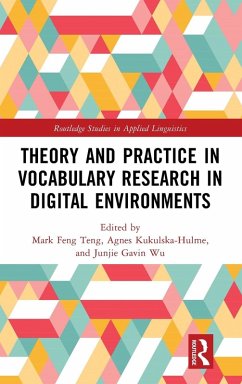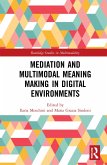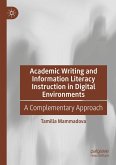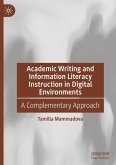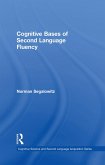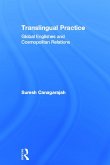Theory and Practice in Vocabulary Research in Digital Environments
Herausgeber: Feng Teng, Mark; Wu, Junjie Gavin; Kukulska-Hulme, Agnes
Theory and Practice in Vocabulary Research in Digital Environments
Herausgeber: Feng Teng, Mark; Wu, Junjie Gavin; Kukulska-Hulme, Agnes
- Gebundenes Buch
- Merkliste
- Auf die Merkliste
- Bewerten Bewerten
- Teilen
- Produkt teilen
- Produkterinnerung
- Produkterinnerung
This collection is a comprehensive resource on the state of second language vocabulary learning today, building on earlier studies to spotlight the diversity of issues and foci in the field toward encouraging further advancements in both research and practice.
Andere Kunden interessierten sich auch für
![Mediation and Multimodal Meaning Making in Digital Environments Mediation and Multimodal Meaning Making in Digital Environments]() Mediation and Multimodal Meaning Making in Digital Environments180,99 €
Mediation and Multimodal Meaning Making in Digital Environments180,99 €![Researching Incidental Vocabulary Learning in a Second Language Researching Incidental Vocabulary Learning in a Second Language]() Researching Incidental Vocabulary Learning in a Second Language191,99 €
Researching Incidental Vocabulary Learning in a Second Language191,99 €![Academic Writing and Information Literacy Instruction in Digital Environments Academic Writing and Information Literacy Instruction in Digital Environments]() Tamilla MammadovaAcademic Writing and Information Literacy Instruction in Digital Environments81,99 €
Tamilla MammadovaAcademic Writing and Information Literacy Instruction in Digital Environments81,99 €![Constructions and Environments Constructions and Environments]() Peter PetreConstructions and Environments158,99 €
Peter PetreConstructions and Environments158,99 €![Academic Writing and Information Literacy Instruction in Digital Environments Academic Writing and Information Literacy Instruction in Digital Environments]() Tamilla MammadovaAcademic Writing and Information Literacy Instruction in Digital Environments81,99 €
Tamilla MammadovaAcademic Writing and Information Literacy Instruction in Digital Environments81,99 €![Cognitive Bases of Second Language Fluency Cognitive Bases of Second Language Fluency]() Norman SegalowitzCognitive Bases of Second Language Fluency204,99 €
Norman SegalowitzCognitive Bases of Second Language Fluency204,99 €![Translingual Practice Translingual Practice]() Suresh CanagarajahTranslingual Practice206,99 €
Suresh CanagarajahTranslingual Practice206,99 €-
-
-
This collection is a comprehensive resource on the state of second language vocabulary learning today, building on earlier studies to spotlight the diversity of issues and foci in the field toward encouraging further advancements in both research and practice.
Hinweis: Dieser Artikel kann nur an eine deutsche Lieferadresse ausgeliefert werden.
Hinweis: Dieser Artikel kann nur an eine deutsche Lieferadresse ausgeliefert werden.
Produktdetails
- Produktdetails
- Verlag: Taylor & Francis
- Seitenzahl: 260
- Erscheinungstermin: 27. Dezember 2024
- Englisch
- Abmessung: 229mm x 152mm x 18mm
- Gewicht: 540g
- ISBN-13: 9781032434858
- ISBN-10: 1032434856
- Artikelnr.: 70889992
- Herstellerkennzeichnung
- Libri GmbH
- Europaallee 1
- 36244 Bad Hersfeld
- 06621 890
- Verlag: Taylor & Francis
- Seitenzahl: 260
- Erscheinungstermin: 27. Dezember 2024
- Englisch
- Abmessung: 229mm x 152mm x 18mm
- Gewicht: 540g
- ISBN-13: 9781032434858
- ISBN-10: 1032434856
- Artikelnr.: 70889992
- Herstellerkennzeichnung
- Libri GmbH
- Europaallee 1
- 36244 Bad Hersfeld
- 06621 890
Mark Feng Teng is an Associate Professor in Applied Linguistics at Macao Polytechnic University, China. Agnes Kukulska-Hulme is a Professor of Learning Technology and Communication in the Institute of Educational Technology at the Open University, UK. Junjie Gavin Wu is a Lecturer and a Ph.D. Supervisor at Macao Polytechnic University, China.
Contents
List of figures
List of contributors
Acknowledgements
Preface
1. Introduction to Theory and Practice in Vocabulary Research in Digital
Environments
Mark Feng Teng and Junjie Gavin Wu
Part I
Theories and synthesis
2. Intentional vocabulary learning through captioned viewing: Comparing
Vanderplank's 'cognitive-affective model' with Gesa and Miralpeix
Robert Vanderplank and Mark Feng Teng.
3. Mapping the digital game-based vocabulary learning landscape: A
comprehensive bibliometric exploration
Zhaoyang Xiong, Junjie Gavin Wu,,and Di Zou
4. Development of gloss studies in vocabulary learning research
Makoto Yoshii
Part II Pedagogical practices
5. A corpus-based study of learners' language learning trajectories with
captioned viewing: Implications for vocabulary learning practices
Mark Feng Teng and Jesse W. C. Yip
6. L2 vocabulary learning with an AI chatbot: From linguistic, affective,
and cognitive perspectives
Sangmin-Michelle Lee
7. Training to use machine translation for vocabulary learning
Yijen Wang and Glenn Stockwell
8. Korean EFL learners' vocabulary development through asynchronous CMC and
synchronous CMC in content courses
Sung-Yeon Kim
9. The anatomy of word lists in New Word Level Checker: Description and
comparison
Atsushi Mizumoto
10. Mobile-assisted vocabulary learning in an EAP context
Jeong-Bae Son and Sang-Soon Park
11. Vocabulary learning with Netflix: Exploring intraformal learning
practices through the lens of Complex Dynamic Systems Theory
Antonie Alm and Yuki Watanabe
12. Using TikTok for vocabulary learning: Multimodal implications
Yeong-Ju Lee
13. Conclusion: The next generation of studies in multimodal, multilingual,
and multi-agent vocabulary learning
Agnes Kukulska-Hulme
Index
List of figures
List of contributors
Acknowledgements
Preface
1. Introduction to Theory and Practice in Vocabulary Research in Digital
Environments
Mark Feng Teng and Junjie Gavin Wu
Part I
Theories and synthesis
2. Intentional vocabulary learning through captioned viewing: Comparing
Vanderplank's 'cognitive-affective model' with Gesa and Miralpeix
Robert Vanderplank and Mark Feng Teng.
3. Mapping the digital game-based vocabulary learning landscape: A
comprehensive bibliometric exploration
Zhaoyang Xiong, Junjie Gavin Wu,,and Di Zou
4. Development of gloss studies in vocabulary learning research
Makoto Yoshii
Part II Pedagogical practices
5. A corpus-based study of learners' language learning trajectories with
captioned viewing: Implications for vocabulary learning practices
Mark Feng Teng and Jesse W. C. Yip
6. L2 vocabulary learning with an AI chatbot: From linguistic, affective,
and cognitive perspectives
Sangmin-Michelle Lee
7. Training to use machine translation for vocabulary learning
Yijen Wang and Glenn Stockwell
8. Korean EFL learners' vocabulary development through asynchronous CMC and
synchronous CMC in content courses
Sung-Yeon Kim
9. The anatomy of word lists in New Word Level Checker: Description and
comparison
Atsushi Mizumoto
10. Mobile-assisted vocabulary learning in an EAP context
Jeong-Bae Son and Sang-Soon Park
11. Vocabulary learning with Netflix: Exploring intraformal learning
practices through the lens of Complex Dynamic Systems Theory
Antonie Alm and Yuki Watanabe
12. Using TikTok for vocabulary learning: Multimodal implications
Yeong-Ju Lee
13. Conclusion: The next generation of studies in multimodal, multilingual,
and multi-agent vocabulary learning
Agnes Kukulska-Hulme
Index
Contents
List of figures
List of contributors
Acknowledgements
Preface
1. Introduction to Theory and Practice in Vocabulary Research in Digital
Environments
Mark Feng Teng and Junjie Gavin Wu
Part I
Theories and synthesis
2. Intentional vocabulary learning through captioned viewing: Comparing
Vanderplank's 'cognitive-affective model' with Gesa and Miralpeix
Robert Vanderplank and Mark Feng Teng.
3. Mapping the digital game-based vocabulary learning landscape: A
comprehensive bibliometric exploration
Zhaoyang Xiong, Junjie Gavin Wu,,and Di Zou
4. Development of gloss studies in vocabulary learning research
Makoto Yoshii
Part II Pedagogical practices
5. A corpus-based study of learners' language learning trajectories with
captioned viewing: Implications for vocabulary learning practices
Mark Feng Teng and Jesse W. C. Yip
6. L2 vocabulary learning with an AI chatbot: From linguistic, affective,
and cognitive perspectives
Sangmin-Michelle Lee
7. Training to use machine translation for vocabulary learning
Yijen Wang and Glenn Stockwell
8. Korean EFL learners' vocabulary development through asynchronous CMC and
synchronous CMC in content courses
Sung-Yeon Kim
9. The anatomy of word lists in New Word Level Checker: Description and
comparison
Atsushi Mizumoto
10. Mobile-assisted vocabulary learning in an EAP context
Jeong-Bae Son and Sang-Soon Park
11. Vocabulary learning with Netflix: Exploring intraformal learning
practices through the lens of Complex Dynamic Systems Theory
Antonie Alm and Yuki Watanabe
12. Using TikTok for vocabulary learning: Multimodal implications
Yeong-Ju Lee
13. Conclusion: The next generation of studies in multimodal, multilingual,
and multi-agent vocabulary learning
Agnes Kukulska-Hulme
Index
List of figures
List of contributors
Acknowledgements
Preface
1. Introduction to Theory and Practice in Vocabulary Research in Digital
Environments
Mark Feng Teng and Junjie Gavin Wu
Part I
Theories and synthesis
2. Intentional vocabulary learning through captioned viewing: Comparing
Vanderplank's 'cognitive-affective model' with Gesa and Miralpeix
Robert Vanderplank and Mark Feng Teng.
3. Mapping the digital game-based vocabulary learning landscape: A
comprehensive bibliometric exploration
Zhaoyang Xiong, Junjie Gavin Wu,,and Di Zou
4. Development of gloss studies in vocabulary learning research
Makoto Yoshii
Part II Pedagogical practices
5. A corpus-based study of learners' language learning trajectories with
captioned viewing: Implications for vocabulary learning practices
Mark Feng Teng and Jesse W. C. Yip
6. L2 vocabulary learning with an AI chatbot: From linguistic, affective,
and cognitive perspectives
Sangmin-Michelle Lee
7. Training to use machine translation for vocabulary learning
Yijen Wang and Glenn Stockwell
8. Korean EFL learners' vocabulary development through asynchronous CMC and
synchronous CMC in content courses
Sung-Yeon Kim
9. The anatomy of word lists in New Word Level Checker: Description and
comparison
Atsushi Mizumoto
10. Mobile-assisted vocabulary learning in an EAP context
Jeong-Bae Son and Sang-Soon Park
11. Vocabulary learning with Netflix: Exploring intraformal learning
practices through the lens of Complex Dynamic Systems Theory
Antonie Alm and Yuki Watanabe
12. Using TikTok for vocabulary learning: Multimodal implications
Yeong-Ju Lee
13. Conclusion: The next generation of studies in multimodal, multilingual,
and multi-agent vocabulary learning
Agnes Kukulska-Hulme
Index

